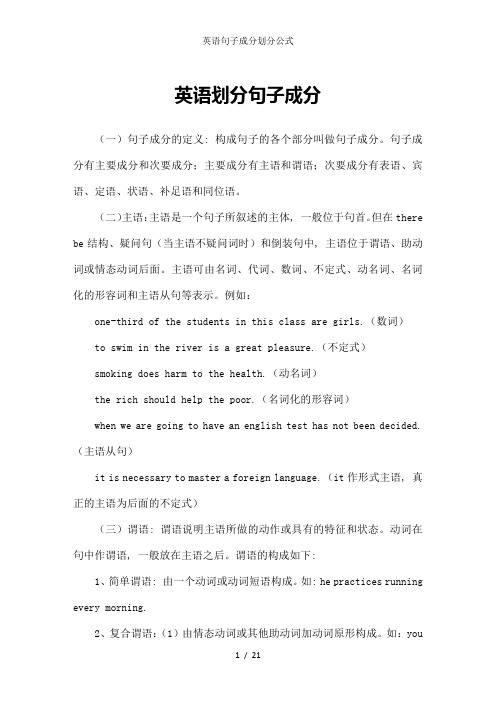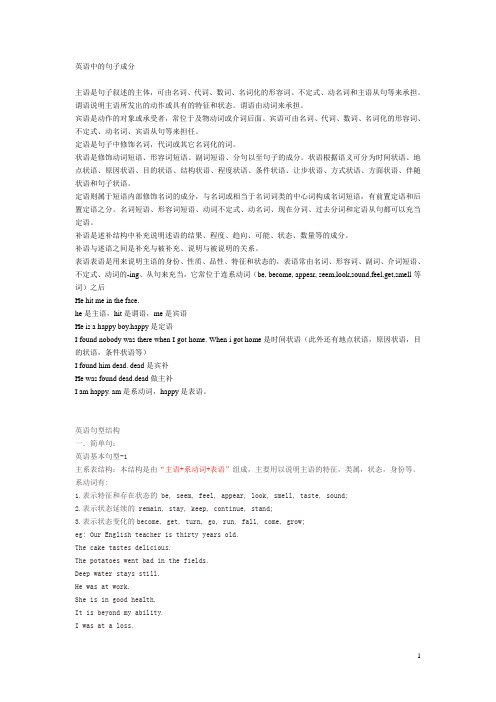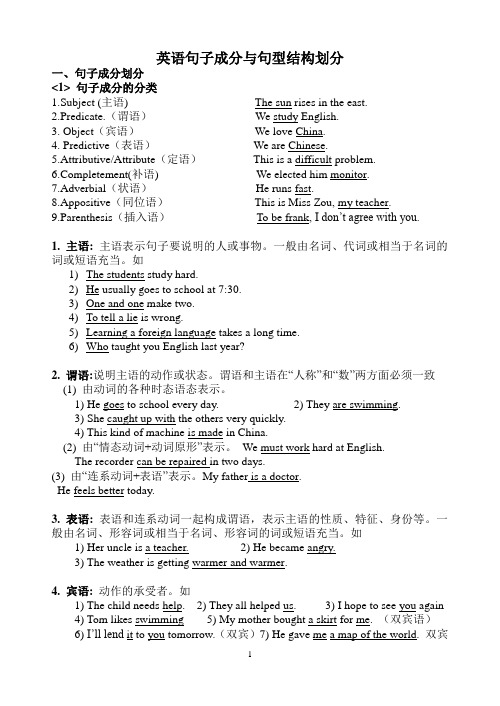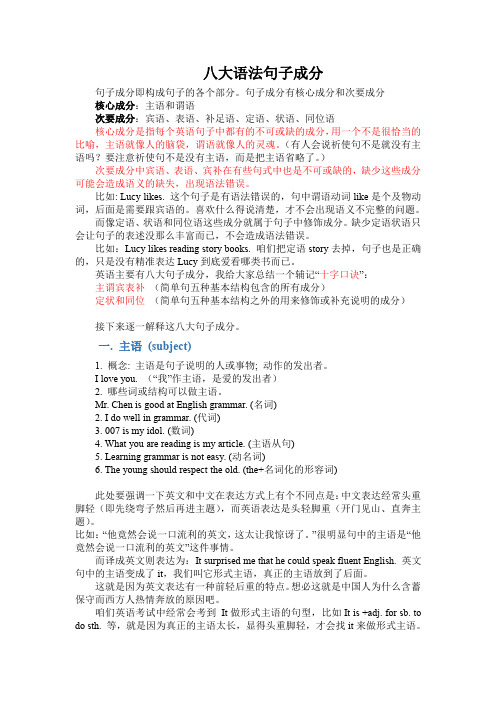英语中各句子成分划分
英语句子成分划分公式

英语划分句子成分(一)句子成分的定义: 构成句子的各个部分叫做句子成分。
句子成分有主要成分和次要成分;主要成分有主语和谓语;次要成分有表语、宾语、定语、状语、补足语和同位语。
(二)主语:主语是一个句子所叙述的主体, 一般位于句首。
但在there be结构、疑问句(当主语不疑问词时)和倒装句中, 主语位于谓语、助动词或情态动词后面。
主语可由名词、代词、数词、不定式、动名词、名词化的形容词和主语从句等表示。
例如:one-third of the students in this class are girls.(数词)to swim in the river is a great pleasure.(不定式)smoking does harm to the health.(动名词)the rich should help the poor.(名词化的形容词)when we are going to have an english test has not been decided.(主语从句)it is necessary to master a foreign language.(it作形式主语, 真正的主语为后面的不定式)(三)谓语: 谓语说明主语所做的动作或具有的特征和状态。
动词在句中作谓语, 一般放在主语之后。
谓语的构成如下:1、简单谓语: 由一个动词或动词短语构成。
如: he practices running every morning.2、复合谓语:(1)由情态动词或其他助动词加动词原形构成。
如:youmay keep the book for two weeks.he has caught a bad cold.(2)由系动词加表语构成。
如:we are students.our teacher of english is an american.(名词)is it yours(代词)the weather has turned cold.(形容词)the speech is exciting.(分词)three times seven is twenty one(数词)his job is to teach english.(不定式)his hobby(爱好)is playing football.(动名词)the machine must be out of order.(介词短语)time is up.the class is over.(副词)the truth is that he has never been abroad.(表语从句)(五)宾语: 宾语表示动作的对象或承爱者, 一般位于与物动词和介词后面。
英语中的句子成分

英语中的句子成分主语是句子叙述的主体,可由名词、代词、数词、名词化的形容词、不定式、动名词和主语从句等来承担。
谓语说明主语所发出的动作或具有的特征和状态。
谓语由动词来承担。
宾语是动作的对象或承受者,常位于及物动词或介词后面。
宾语可由名词、代词、数词、名词化的形容词、不定式、动名词、宾语从句等来担任。
定语是句子中修饰名词,代词或其它名词化的词。
状语是修饰动词短语、形容词短语、副词短语、分句以至句子的成分。
状语根据语义可分为时间状语、地点状语、原因状语、目的状语、结构状语、程度状语、条件状语、让步状语、方式状语、方面状语、伴随状语和句子状语。
定语则属于短语内部修饰名词的成分,与名词或相当于名词词类的中心词构成名词短语,有前置定语和后置定语之分。
名词短语、形容词短语、动词不定式、动名词、现在分词、过去分词和定语从句都可以充当定语。
补语是述补结构中补充说明述语的结果、程度、趋向、可能、状态、数量等的成分。
补语与述语之间是补充与被补充、说明与被说明的关系。
表语表语是用来说明主语的身份、性质、品性、特征和状态的,表语常由名词、形容词、副词、介词短语、不定式、动词的-ing、从句来充当,它常位于连系动词(be, become, appear, seem,look,sound,feel,get,smell等词)之后He hit me in the face.he是主语,hit是谓语,me是宾语He is a happy boy.happy是定语I found nobody was there when I got home. When i got home是时间状语(此外还有地点状语,原因状语,目的状语,条件状语等)I found him dead. dead是宾补He was found dead.dead做主补I am happy. am是系动词,happy是表语。
英语句型结构一.简单句:英语基本句型-1主系表结构:本结构是由“主语+系动词+表语”组成,主要用以说明主语的特征,类属,状态,身份等。
英语句子成分分析法结构解析

英语句子成分分析法结构解析很多同学对英语的句子成分搞不懂,所以就影响了他们的阅读和写作,以及做其他类型题目的能力。
今天店铺为大家带来了英语句子成分分析,欢迎大家阅读!英语句子成分分析篇一一、句子成分(一)句子成分的定义:构成句子的各个部分叫做句子成分。
句子成分有主要成分和次要成分;主要成分有主语和谓语;次要成分有表语、宾语、定语、状语、补足语和同位语。
(二)主语:主语是一个句子所叙述的主体,一般位于句首。
但在there be结构、疑问句(当主语不疑问词时)和倒装句中,主语位于谓语、助动词或情态动词后面。
主语可由名词、代词、数词、不定式、动名词、名词化的形容词和主语从句等表示。
例:划出下列句子的主语,并在括号内写出它的词性或充当的是什么从句。
1. During the 1990s, American country music has become more and more popular.( )2. We often speak English in class.( )3. One-third of the students in this class are girls.( )4. To swim in the river is a great pleasure.( )5. Smoking does harm to the health.( )6. The rich should help the poor.( )7. When we are going to have an English test has not been decided.( )8. It is necessary to master a foreign language.( )(三)谓语:谓语说明主语所做的动作或具有的特征和状态。
动词在句中作谓语,一般放在主语之后。
谓语的构成如下:1、简单谓语:由一个动词或动词短语构成。
(完整版)英语句子成分划分公式

英语划分句子成分(一)句子成分的定义:构成句子的各个部分叫做句子成分。
句子成分有主要成分和次要成分;主要成分有主语和谓语;次要成分有表语、宾语、定语、状语、补足语和同位语。
(二)主语:主语是一个句子所叙述的主体,一般位于句首。
但在there be结构、疑问句(当主语不疑问词时)和倒装句中,主语位于谓语、助动词或情态动词后面.主语可由名词、代词、数词、不定式、动名词、名词化的形容词和主语从句等表示。
例如:one—third of the students in this class are girls.(数词)to swim in the river is a great pleasure.(不定式)smoking does harm to the health。
(动名词)the rich should help the poor。
(名词化的形容词)when we are going to have an english test has not been decided.(主语从句)it is necessary to master a foreign language.(it作形式主语,真正的主语为后面的不定式)(三)谓语:谓语说明主语所做的动作或具有的特征和状态。
动词在句中作谓语,一般放在主语之后。
谓语的构成如下:1、简单谓语:由一个动词或动词短语构成。
如:he practices running every morning.2、复合谓语:(1)由情态动词或其他助动词加动词原形构成.如:you may keep the book for two weeks。
he has caught a bad cold。
(2)由系动词加表语构成.如:we are students。
our teacher of english is an american。
(名词)is it yours?(代词)the weather has turned cold.(形容词)the speech is exciting。
英语句型结构与句子成分划分

英语句子成分与句型结构划分一、句子成分划分<1> 句子成分的分类1.Subject (主语) The sun rises in the east.2.Predicate.(谓语)We study English.3. Object(宾语)We love China.4. Predictive(表语)We are Chinese.5.Attributive/Attribute(定语)This is a difficult problem.pletement(补语) We elected him monitor.7.Adverbial(状语)He runs fast.8.Appositive(同位语)This is Miss Zou, my teacher.9.Parenthesis(插入语)To be frank, I don’t agree with you.1. 主语:主语表示句子要说明的人或事物。
一般由名词、代词或相当于名词的词或短语充当。
如1)The students study hard.2)He usually goes to school at 7:30.3)One and one make two.4)To tell a lie is wrong.5)Learning a foreign language takes a long time.6)Who taught you English last year?2. 谓语:说明主语的动作或状态。
谓语和主语在“人称”和“数”两方面必须一致(1) 由动词的各种时态语态表示。
1) He goes to school every day. 2) They are swimming.3) She caught up with the others very quickly.4) This kind of machine is made in China.(2) 由“情态动词+动词原形”表示。
英语八大语法句子成分

八大语法句子成分句子成分即构成句子的各个部分。
句子成分有核心成分和次要成分核心成分:主语和谓语次要成分:宾语、表语、补足语、定语、状语、同位语核心成分是指每个英语句子中都有的不可或缺的成分,用一个不是很恰当的比喻,主语就像人的脑袋,谓语就像人的灵魂。
(有人会说祈使句不是就没有主语吗?要注意祈使句不是没有主语,而是把主语省略了。
)次要成分中宾语、表语、宾补在有些句式中也是不可或缺的,缺少这些成分可能会造成语义的缺失,出现语法错误。
比如:Lucy likes.这个句子是有语法错误的,句中谓语动词like是个及物动词,后面是需要跟宾语的。
喜欢什么得说清楚,才不会出现语义不完整的问题。
而像定语、状语和同位语这些成分就属于句子中修饰成分。
缺少定语状语只会让句子的表述没那么丰富而已,不会造成语法错误。
比如:Lucy likes reading story books.咱们把定语story去掉,句子也是正确的,只是没有精准表达Lucy到底爱看哪类书而已。
英语主要有八大句子成分,我给大家总结一个辅记“十字口诀”:主谓宾表补(简单句五种基本结构包含的所有成分)定状和同位(简单句五种基本结构之外的用来修饰或补充说明的成分)接下来逐一解释这八大句子成分。
一.主语(subject)1.概念:主语是句子说明的人或事物;动作的发出者。
I love you.(“我”作主语,是爱的发出者)2.哪些词或结构可以做主语。
Mr.Chen is good at English grammar.(名词)2.I do well in grammar.(代词)3.007is my idol.(数词)4.What you are reading is my article.(主语从句)5.Learning grammar is not easy.(动名词)6.The young should respect the old.(the+名词化的形容词)此处要强调一下英文和中文在表达方式上有个不同点是:中文表达经常头重脚轻(即先绕弯子然后再进主题),而英语表达是头轻脚重(开门见山、直奔主题)。
英语划分句子成分句式练习题及答案
英语句子成分与结构英语句子成分(一)句子成分的定义:构成句子的各个部分叫做句子成分。
句子成分有主要成分和次要成分;主要成分有主语和谓语;次要成分有表语、宾语、定语、状语、补足语和同位语。
(二)主语:主语是一个句子所叙述的主体,一般位于句首。
但在there be结构、疑问句(当主语不疑问词时)和倒装句中,主语位于谓语、助动词或情态动词后面。
主语可由名词、代词、数词、不定式、动名词、名词化的形容词和主语从句等表示。
例如:During the 1990s, American country music has become more and more popular.(名词)We often speak English in class.(代词)One-third of the students in this class are girls.(数词)To swim in the river is a great pleasure.(不定式)Smoking does harm to the health.(动名词)The rich should help the poor.(名词化的形容词)When we are going to have an English test has not been decided.(主语从句)It is necessary to master a foreign language.(it作形式主语,真正的主语为后面的不定式)(三)谓语:谓语说明主语所做的动作或具有的特征和状态。
动词在句中作谓语,一般放在主语之后。
谓语的构成如下:1、简单谓语:由一个动词或动词短语构成。
如:He practices running every morning.2、复合谓语:(1)由情态动词或其他助动词加动词原形构成。
如:You may keep the book for two weeks. He has caught a bad cold. (2)由系动词加表语构成。
英语的句子成分及五大基本句型
基本句型二:S+V+P.(主+系+表) 这种句型结构主要指谓 语动词为连系动词的情况。 如: She is Peter's sister. 她是彼得的妹妹。 That dog looks dangerous. 那只狗看起来很危险。
基本句型三: S+V+O(主+谓+宾) 英语中绝大多数及物 动词只带一个宾语,这种动词叫单宾语及物动词。 如: Everyone likes him. 大家都喜欢他。 We study English and French. 我们学习英语和法语。
定语:定语为句子的次要成分,起修饰限制名词或代词的作用, 可分为前置定语和后置定语。一般由形容词性物主代词、数词、 形容词、副词、介词短语、动词不定式、分词(短语) 或句子充 当。 例: His father is a doctor. 他父亲是一名医生。 Mr. Green has two sons. 格林先生有两个儿子。 The girl under the tree is Kate. 在树底下的那个女孩是凯特。 The man downstairs couldn’t sleep well. I bought a new dictionary. 我买了本新字典。 Can you find out the answer to the question? A barking dog seldom bites. 吠狗很少咬人。 A man going to die is always kind-hearted. The suggestion sent to the committee was adopted. Do you know the man who is standing next to Mr. Green?
英语句子成分
句子成分分析一.句子的成分组成句子的各个部分叫做句子的成分。
句子成分包括主语、谓语、表语、宾语(直接宾语、间接宾语)、宾语补足语、定语和状语。
主语和谓语是句子主体部分在英文中一般的句子必须有主语和谓语。
表语、宾语和宾语补足语是谓语里的组成部分。
其他成分如定语和状语是句子的次要部分。
下面我们分别讲述一下句子的各个成分1 主语主语是谓语讲述的对象表示所说的“是什么”或“是谁”。
一般由名词、代词、不定式或相当于名词的词或短语来充当。
它在句首。
例如1:We study in Middle School.讲述“谁”我们在一中学习。
例如2:The classroom is very clean. 讲述“什么”很干净这间教室很干净。
Three were absent.(数词作主语)三个人缺席。
To teach them English is my job. (不定式作主语)教他们英语是我的工作。
注意不定式作主语时常用形式主语it句型因此左例可变为It is my job to teach them English.真正的主语是to teach them English.2 谓语:说明主语“做什么”“是什么”或“怎么样”。
谓语部分里主要的词必须用动词。
谓语和主语在人称和数两方面必须一致。
它在主语后面。
His Parents are doctors.系动词和表语一起作谓语他的父母亲是医生。
She looks well.系动词和表语一起作谓语她看起来气色面色很好。
We study hard.实义动词作谓语我们努力学习。
We have finished reading the book. 助动词和实义动词一起作谓语我们已经看完了这本书。
He can speak English. (情态动词和实义动词作谓语)他会说英语。
3 表语表语说明主语“是什么”或者“怎么样”由名词、形容词、副词、介词、不定式及相当于名词或形容词的词或短语来担任。
英语中常见的句子成分
英语中常见的句子成分句子成分就是组成句子的各个部分。
句子成分主要有主语、谓语、宾语、表语、定语、状语、补足语、同位语、独立成分等。
构成句子的主体部分是主语和谓语。
表语、宾语和补足语是句子的主要成分。
其他成分如定语、状语、同位语和独立成分是句子的次要成分。
1主语主语是一个句子的主体,一般位于句首。
名词(短语)、代词、数词、不定式(短语)、动名词(短语)、从句等均可作主语。
Eg. Pride goes before a fall.骄必败。
2谓语谓语用来描述主语的行为动作或所处的状态,一般位于主语之后,由动词或动词短语充当,且谓语动词有人称、数、时态和语态等的变化。
Eg. I bought a ticket at a discount and rode the underground three times.我买了一张打折票,坐了三次地铁。
3宾语宾语是动作的承受者,一般位于及物动词之后。
名词(短语)、代词、数词、名词化的形容词、名词化的分词、不定式(短语)、动名词(短语)、从句等均可充当宾语成分。
Eg. People love to get together to eat,drink and have fun with each other.人们喜欢聚到一起吃喝玩乐。
4表语表语用来说明主语的特征、类属、状态、身份等。
一般位于系动词之后,与之构成系表结构。
名词(短语)、代词、数词、形容词、副词、介词短语、不定式(短语)、动名词(短语)、分词、从句等均可作表语。
Eg. This gift was the Amber Room,which was given this name because several tons of amber were used to make it.这件礼物就是琥珀屋,它之所以有这个名字,是因为造这间房子用了好几吨的琥珀。
5定语定语是修饰名词或代词,用来描述人或事物的品质或特征的句子成分。
- 1、下载文档前请自行甄别文档内容的完整性,平台不提供额外的编辑、内容补充、找答案等附加服务。
- 2、"仅部分预览"的文档,不可在线预览部分如存在完整性等问题,可反馈申请退款(可完整预览的文档不适用该条件!)。
- 3、如文档侵犯您的权益,请联系客服反馈,我们会尽快为您处理(人工客服工作时间:9:00-18:30)。
主补:对主语的补充。
He was elected monitor. She was found singing in the next room.
He was advised to teach the lazy boy a lesson.
Tired and sad,she told her story tearfully.
此句型的句子有一个共同的特点:句子谓语动词都不
能表达一个完整的意思,必须加上一个表明主语身份 或状态的表语构成复合谓语,才能表达完整的意思。 这类动词叫做连系动词。
4. 主语+谓语+间接宾语+直接宾语(SVoO) 常跟双宾语的及物动词有: (需借助to的) bring, give, lend, hand, offer, pass, pay, promise, return, send, show, teach, tell, write, 等; (需借助for 的) buy, call, cook, choose, draw, find, get, make, order, sing, save, spare,等。 He sent me an English-Chinese Dictionary. = He sent an English-Chinese Dictionary to me. She gave John a book. = She bought a book for me. He showed me how to run the machine.
此句型的句子的共同特点是:动词虽然是及物动词,但 是只跟一个宾语还不能表达完整的意思,必须加上一个 补充成分来补足宾语,才能使意思完整。
宾语补足语:位于宾语之后对宾语作出说明的成分。可 以用作宾语补足语的有名词,形容词,不定式,分词, 介词短语等。
Arrange these words to make sentences
句子成分
主语(subject): 句子说明的人或事物。 The sun rises in the east. (名词) He likes dancing. (代词) Twenty years is a short time in history. (数词) Seeing is believing. (动名词) To see is to believe. (不定式) What he needs is a book. (主语从句) It is very clear that the elephant is round and tall like a tree. (It形式主语,主语从句是真正主语)
英语句子成分
句子成分
主语(subject)
谓语(predicate) 宾语(object) 表语(predicative) 宾语补足语(宾补object complement)
定语(attributive)
状语(adverbial) 主语补足语(主补subject complement)
简单句的基本句型
5. 主语+谓语(及物动词)+宾语+宾补 (SVOC) 此结构中的宾语与宾则句意不完整。可以
用做宾补的有名词,形容词,介词短语,动词不定式,
分词等。
She makes her mother angry. The teacher asked me to read the passage.
定语:修饰或限制名词或代词的词、词组或句子。
Miss Yang is a chemistry teacher. (名词) He is our friend. (代词) We belong to the third world. (数词) He was advised to teach the lazy boy a lesson.(形容词) The man over there is my old friend.(副词) The woman with a baby in her arms is my sister. (介词) The boys playing football are in Class 2. (分词) The trees planted last year are growing well now.(分词) I have an idea to do it well. (不定式) (定语从句) You should do everything that I do.
宾补:对宾语的补充,全称为宾语补足语。
We elected him monitor. (名词) We all think it a pity that she didn’t come here. We will make them happy. (形容词) We found nobody in. ( 副词 ) Please make yourself at home. (介词短语) Don’t let him do that. (省to不定式) His father advised him to teach the lazy boy a lesson. (带to不定式) Don’t keep the lights burning. (现在分词) I’ll have my bike repaired. (过去分词)
状语:用来修饰v., adj., adv., or 句子。 表示时间、 地点、原因、目的、结果、程度、条件、方式、让 步和伴随。 I will go there tomorrow. The meeting will be held in the meeting room. The meat went bad because of the hot weather He studies hard to learn English well. He didn’t study hard so that he failed in the exam. I like some of you very much. If you study hard, you will pass the exam. He goes to school by bike. Though he is young, he can do it well. The teacher came in, with a book in his hand.
1. 主语+谓语 (SV) 2. 主语+谓语+宾语 (SVO) 3. 主语+连系动词+表语 (SVC) 4. 主语+谓语+间接宾语+直接宾语 (SVoO) 5. 主语+谓语(及物动词)+宾语+宾补 (SVOC)
1. 主语 + 谓语 (SV) 本结构是由“主语+不及物动词(词组)” 构成, 常用来表示主语的动作。如, She came. My head aches. The sun rises. 该句型的主语可有修饰语---定语,如, The red sun rises. 谓语可有修饰语---状语,如, The red sun rises in the east.
6. interesting and expansive/in the city/can be/both/life Life in the city can be both interesting and expansive 7.it/make/your hair/too often/dry/may/shampooing Shampooing your hair too often may make it dry. 8.myself/unlucky/thought/very I thought myself very unlucky. 9.the tired student/in the afternoon/a nap/took The tired student took a nap in the afternoon. 10. his car/to Beijing/drove his car to Beijing. The salesman drove his car to Beijing.
谓语(predicate): 说明主语的动作、状态和特征 英语中只有动词才能作谓语。 We study English.
He is asleep.
宾语: 1)动作的承受者-----动宾 I like China. (名词) He hates you. (代词) How many do you need? We need two. (数词) We should help the old and the poor. I enjoy working with you. (动名词) I hope to see you again. (不定式) Did you write down what he said? (宾语从句) 2) 介词后的名词、代词和动名词-----介宾 Are you afraid of the snake? Under the snow, there are many rocks. 3) 双宾语-----间宾(指人)和直宾(指物) He gave me a book yesterday. Give the poor man some money.
此句型的句子有一个共同特点,即句子的谓语 动词都能表达完整的意思。这类动词叫做不及
物动词,后面可以跟副词、介词短语、状语从句
等。
2. 主语 + 谓语 + 宾语 (SVO) 此结构是由“主语+及物动词(词组) + 宾语”构成。宾 语可以是名词、代词、数词,动名词、动词不定式或 词组、the +形容词、分词以及从句等。如, 1. Who │knows │the answer? 2. He │has refused │to help them. 3. He │enjoys │reading. 4. He │said │"Good morning." 5. He │admits │that he was mistaken.
